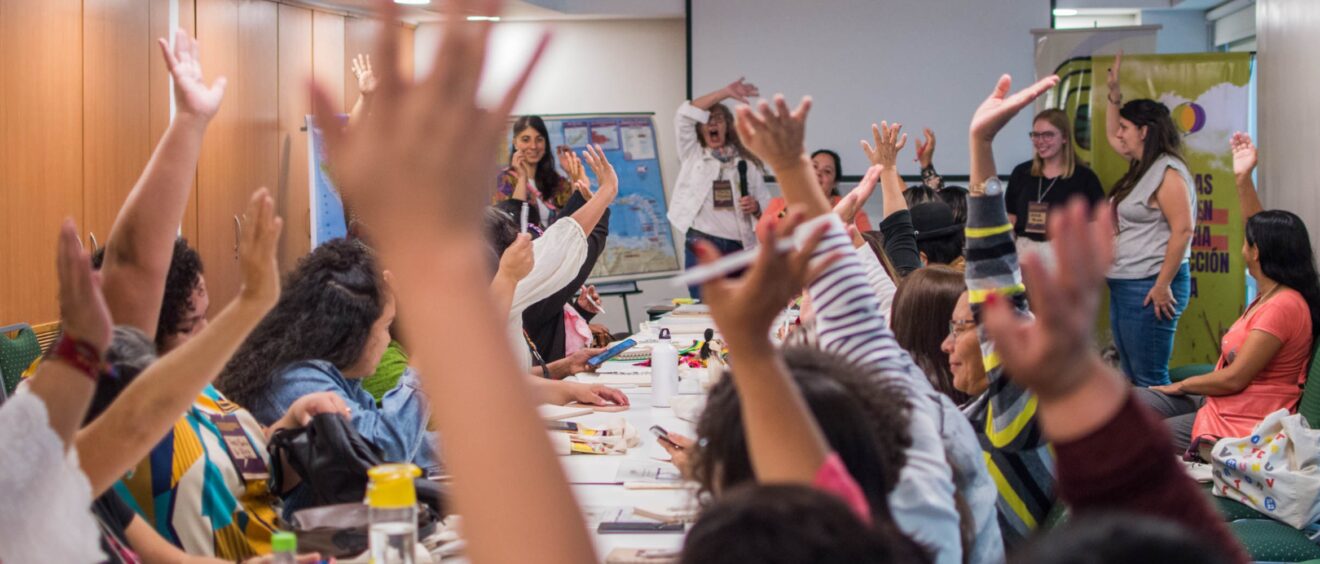
Examination of Power – Partners’ perspectives on Both ENDS
Both ENDS supports movements that are transforming power relations so that people everywhere can influence and share in the benefits of political and economic processes. In order to effectively create a sustainable, fair and inclusive world, we know that it’s crucial to analyse power – to examine who holds what kind of power and how they use it – and to work to recalibrate power as needed. We recognise that power – including its positive forms, such as the ‘power with’ and ‘power to’ bring about social change – is a crucial factor in the world around us, as well as in our own relationships, especially with partners.
Both ENDS is committed to working with partners in relationships based on equality and trust, where we recognise each other’s expertise, actively learn together and cooperate toward shared goals. In line with these principles, we have long advocated for funding mechanisms, like small grants funds, that shift decision-making power to the local groups and communities they aim support. Thankfully, there are signs of progress: the topic of ‘shifting power’ has risen higher on the agenda of the development cooperation and global philanthropy sectors. Appreciation of the need to move away from top-down decision-making, where resources and decision-making power lie in the hands of donors from the Global North, is slowly gaining traction.
Co-designed by partners
Both ENDS has always strived to be an equitable partner, but our discussions about power prompted us to examine our own assumptions, particularly the assumption that channeling an increasing amount of funding to partners does not affect our relationships with them. It is within this context that we embarked on an ‘Examination of Power’ process in 2023. The main purpose of the process was to better understand how Both ENDS holds power and how partners experience equity and power in their relationship with Both ENDS, as well as to learn how we can better share power towards fair and equitable partnerships.
The process was led by a team of independent consultants and a randomly selected, diverse group of six willing partners from the Global South who co-designed the process and participated in multiple meetings to share their perspectives on power as it relates to Both ENDS and their relationship. Additional input came from a detailed anonymous survey, which was made available in 5 languages and completed by 82 partners. The results of the survey were analysed by the consultants and the six partners. The partners were subsequently joined by a team of four Both ENDS staff members to discuss the overall findings and recommendations.
Insights and recommendations
The ‘Examination of Power’ process generated a treasure of useful insights. We learned that a majority of partners see Both ENDS first and foremost as an international mission-aligned advocacy partner, and not only as a funder/donor. Our long-term relationships with partners are valued, with 80% of the partners feeling supported by Both ENDS, with high levels of mutual trust, and direct, clear and open communication. Partners told us that their relationship with Both ENDS increases the impact of their advocacy, access to funding, increasing their international network, alliance building and capacity strengthening. Partners value Both ENDS for showing understanding, flexibility, and trust, and for giving them the space to ask questions and voice their opinions.
Partners also provided recommendations for improvement, including the suggestion for Both ENDS to establish and facilitate more connections by making more and better use of its relationships and access to international advocacy spaces and funding. Partners also asked that we communicate better and more regularly about the work of Both ENDS and other partners, as well as about decision-making, including in relation to donors and in the use of funds. Other suggestions included improvements to the administration of funding, such as sharing power by co-creating rules and principles, and engaging in mutual evaluation.
The next step in the ‘Examination of Power’ process will be to develop a plan of action to address these recommendations, and to communicate back to partners about the whole process. We also intend to share information about the process with external parties, including donors, as inspiration for conducting an examination of their own.
Examination of power is a continual process for Both ENDS, also within the organisation. Our Diversity, Equity and Inclusion processes, which have included regular workshops on relevant issues, create space for important, and sometimes uncomfortable, conversations and learning. Topics have included unconscious bias, integrity, and addressing undesirable behaviour. Our work is not finished. Both ENDS is committed to continue learning how to hold, share, and transform power.

Both ENDS supports movements that are transforming power relations so that people everywhere can influence and share in the benefits of political and economic processes. This image was taken at the first-ever “Encuentro Latinoamericano de Defensoras Ambientales para la Acción Climática”, supported by Both ENDS. Photo by Fundación Plurales

“Co-designed by partners” also accounts for our organisational strategy. Every 5 years we invite a group of partners to our Partner Meeting to give input to our new strategy.
